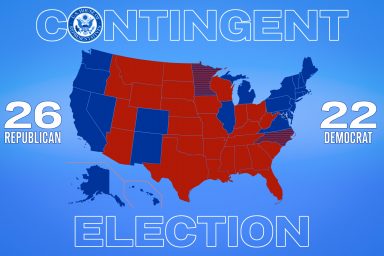The weird drama over the supposed “forensic experts” who messed with election software in a tiny Georgia county distracts from the real problem: Voting machines — and our elections — are indeed vulnerable.
|
Listen To This Story
|
“Fair elections” was perhaps the animating factor in American politics in 2020. That summer, as we all know, Donald Trump seemingly began to prepare for a November loss by declaring ad nauseam that the only way he could lose was if the election was rigged — but the idea that the integrity of the election was at risk was first floated by Joe Biden, who predicted (accurately) as early as June that Trump would “try to steal” the election by casting doubt on mail-in ballots.
Since then, for most people not attending Trump’s post-presidential rallies, the issue has pretty much disappeared. Among “reasonable” people, it’s taken as axiomatic that our elections are secure. But that’s not true. It’s a crisis for our country, beyond the hundreds of election deniers running for key positions overseeing future elections, and the situation sets us up for future disasters.
We know all about that at WhoWhatWhy. Long before Trump hijacked this legitimate issue for illegitimate purposes with the “Stop the Steal” fantasy, we were one of the first news outlets to sound the alarm over the chain of custody of ballots and the vulnerabilities of electronic voting systems.
So-called hybrid voting machines, used to both create and mark and then scan and count barcoded paper ballots, can be manipulated in various ways that are difficult to detect. Hand-marked ballots, with the security of the chain of custody preserved and well documented, are probably the only way to ensure an election wasn’t hijacked.
Election integrity is a real concern. But once Trump commandeered the concept, many reasonable people saw any question of voting machine reliability as dangerous territory, the exclusive realm of MAGA and QAnon kooks.
The way legacy media is covering a ballot machine controversy in tiny Coffee County, GA, is not helping.
There, local GOP officials allowed some purported “election experts” — who were in fact Trump loyalists — to access official election computers and poll pads on January 7, 2021, under the cover story that they were looking for evidence that the 2020 election had indeed been stolen.
Exactly what they were up to is still a mystery, but one theory is that whatever they were doing tainted the Coffee County voting machines — and may have provided a blueprint for stealing future elections. For now, that’s just a theory. Georgia’s Republican election officials have repeatedly insisted that despite the curious visits and the so-called “forensic experts” accessing the machines, there was no sign of any tampering or other shenanigans.
Framed that way, Coffee County sounds like a sideshow. Yet it’s been an ongoing national story. The Washington Post, The New York Times, and other major news organizations have been publishing bits of closed-circuit video footage and other evidence that increasingly show that the local GOP officials and their allies seem to have been evasive, had poor memory, or possibly lied outright about the incident.
Although the Post has played the story prominently and sought to keep its lead over other news outlets on it, something about the way in which the stories focused on the specific local characters and their actions obscures the larger issue — an issue that legacy media may be, understandably, fearful of highlighting.
Recent coverage gives the impression that the only reason the footage is public is a lawsuit. What they neglected to mention: That lawsuit, filed in 2018, was brought about because advocates had identified specific security flaws with internet-connected voting machines, like the ones used in Georgia and four other states.
The following year, observers found internet-connected voting machines, used to upload results from precincts, in 10 states. Ahead of 2020, cybersecurity experts identified 35 voting systems that could be reached — and breached — via the internet, despite insistence to the contrary from Jeanette Manfra, the then-assistant director for cybersecurity for the Department of Homeland Security.
This context was absent from the legacy media’s Coffee County coverage. Who cares that, after the election, a small forensic effort took place to examine the voting system used in a tiny county in Georgia? Neither the Post nor the Times has done a great job of highlighting and focusing public attention, front and center, on what’s at stake in this blurry footage. The Times did raise the point, but only in a final paragraph.
I tried to draw attention to the core problem in a previous newsletter. My point was that, under the guise of investigating possible wrongdoing, the people captured in the video might have been opening the door to actual wrongdoing — i.e., by obtaining the code used in the machines, they could potentially use it to tamper with the whole system.
Now, there’s a tiny bit of acknowledgment of this by state authorities in Georgia. Two weeks ago, Georgia’s Republican secretary of state, Brad Raffensperger — the same Brad Raffensperger whom outgoing President Donald Trump leaned on in the infamous January 2021 phone request to “find” him 11,780 votes — announced that even though nobody could point out exactly what might be amiss, Georgia would go ahead and replace the Dominion Voting Systems equipment in Coffee County anyway.
But that seems more like a distraction and damage control than anything else — since the actual problem is that the incursion could potentially allow people to access and influence voting equipment throughout the state. That’s the real issue: The overall voting system is potentially insecure. (Raffensperger claimed otherwise, as does this Department of Homeland Security report — but experts we’ve consulted for years vehemently disagree.)
And even worse, Georgia’s exposure to covert election manipulation could be the bellwether for the rest of the country.
With very tight elections anticipated in consequential US Senate and gubernatorial races in that state — races that have national implications — it’s deeply concerning that more attention is not being paid to the underlying risks.
Those risks are copious and varied: There’s no reliable paper trail to ensure that miscounts don’t happen accidentally or deliberately, and there are plenty of ways for miscounts to happen.
What happened in Georgia is this: The state bought a lot of ballot-marking devices (BMDs) designed to make voting easier for handicapped people but then made them mandatory for all in-person voters, even though there are grave concerns among experts that these machines have flaws that could potentially permit manipulation.
But you could read about the Trumpy weirdos in Coffee County for hours, and never pick up this vital takeaway.
***
The lack of attention paid by the media to the real problems with voting machines may be explained, in part, by the fact that news organizations have painted themselves into a corner. They’ve been telling their audience that there is nothing to Trump’s election manipulation claims — and they’re right: There’s no evidence to support his Stop the Steal circus.
But the stench of Trump’s Big Lie has had a peculiar and paradoxical impact on coverage of election security and integrity. Because, in their aversion to it, the legacy media have avoided granting even a shred of credence to anything Trump, or anyone associated with Stop the Steal, has been saying on this issue.
And like it or not, Trump is right about a few things — incidentally, that’s why he’s such a compelling figure for so many Americans — and this is one of them, though for all the wrong reasons.
I spoke to a source in the election integrity movement who confirmed to me that no matter what they do, activists cannot get the legacy media to focus on the larger problem at hand, which is that our elections are absolutely vulnerable, everyone knows it, and nobody has tried to remedy the flaws.
Unless this problem is given attention and gets fixed, election fraud could become endemic — in 2022, and beyond.




